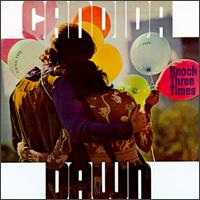| Candida | ||||
|---|---|---|---|---|
 | ||||
| Studio album by | ||||
| Released | 1970 | |||
| Genre | Pop | |||
| Length | 30:11 | |||
| Label | Bell | |||
| Producer | Hank Medress, Phil & Mitch Margo, Jay Siegel | |||
| Dawn chronology | ||||
| ||||
| Review scores | |
|---|---|
| Source | Rating |
| Allmusic | |
Candida is a 1970 album by Dawn, a studio session group including Tony Orlando, Toni Wine, and Linda November. Orlando was singing under the group name "Dawn" in order to avoid problems with his contract with his other label, CBS. However, after the success of the album tracks "Candida" and "Knock Three Times", he invited two other singers to become the real-life "Dawn", and then "Tony Orlando and Dawn" could tour in support of the songs. [2]